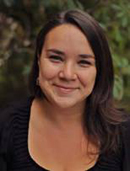By Jessie Mazar
Jessie Mazar is a 2013 graduate of the UVM Global Studies Program in the College of Arts and Sciences. During her time at UVM, she had the opportunity to work closely with Teresa Mares, Assistant Professor of Anthropology at UVM. Teresa will speak at the UVM Food Systems Summit on June 27. In anticipation, we asked Jessie to share something about her experience working with Teresa.
We are driving on roads lined with cornfields, the smell of manure, and dead ends, scanning every small town for an open creemee shop. This is Franklin County, steeped in agricultural heritage in the northwest corner of Vermont, bordering Canada. In a somewhat ironic twist to our search for creemees, Teresa Mares and I are here on part of a food access project, called Huertas, which works with Latino/a migrant farm workers who live and work on isolated dairy farms. These folks, who work on average 10 hours/day, 6 days/week, exist invisibly in Vermont’s working agricultural landscape. Because of this dynamic, it is hard to know exactly, but there are an estimated 1500 Latino/a farm workers fueling the dairy industry of Vermont. While Vermont policies provide some protections for migrant farm workers relative to other states, we still share a border with Canada—“La otra frontera” or “The Other Border” as Teresa has called it, which is patrolled by federal immigration enforcement.
Huertas is coordinated by Naomi Wolcott-MacCausland from UVM Extension and Professor Teresa Mares, and focuses on supporting farm workers to grow their own food. As a researcher, Professor Mares is interested in questions related to how farmworker food access affects their food security and diets. Huertas epitomizes one of the many lessons that I have gleaned in my work with Teresa Mares: do what you can with the circumstances that we are given—in this case it takes the form of delivering vegetable and Mexican herbs, seeds, and starts, and building gardens.
Teresa has been researching the relationship of food and migration for many years. Her Ph.D. dissertation, We Are Made of Our Food: Latino/a Immigration and the Practices and Politics of Eating, explores the relationship of Latino/a immigrants to food justice and how food entitlements are made, reshaped, and denied.
Since arriving in Vermont, Teresa Mares has been an Assistant Professor of Anthropology at the University of Vermont and is involved with the Transdisciplinary Research Initiative in Food Systems. To me, what is unique and remarkable is how Professor Mares fits human connection into her busy days of teaching, publishing, presenting, advising, and mentoring. Professor Mares has enabled students to take what they are learning on a larger, systemic level, and do something, while always returning to the topic through the lens of a researcher. That is the nature and beauty of her work—to take on a situation that is systemically frustrating and unjust, but to address it at the ground level with a sense of conviviality, cross-cultural understanding, and hospitality. That approach to her work is how we end up at a celebration for the third birthday of the daughter of a migrant farm worker on a Saturday afternoon, standing around a Hello Kitty piñata as the sun is setting, noise makers in our mouths, and tamales in our bellies.











